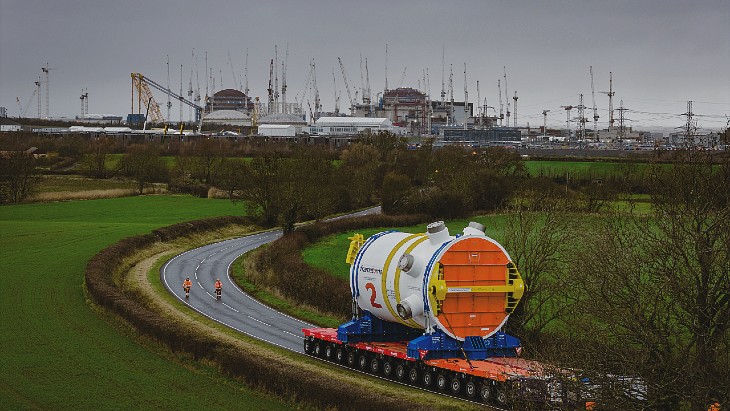The report - titled On the Role of Nuclear Power in the Development of a European Hydrogen Economy - calls for policies designed to boost the clean hydrogen sector to be technology neutral. These policies, it says, should acknowledge that both renewable energy and nuclear power are low-carbon sources of hydrogen production and should be treated equally.
Using nuclear power to produce hydrogen has several advantages compared to using intermittent renewables, NNWI says. Its study found that per unit of installed electrolyser capacity, nuclear power can produce 5.45 times as much clean hydrogen as solar can and 2.23 times as much as wind power can. The report highlights that the land area required to produce hydrogen using nuclear power is considerably lower than that required by renewable energy sources, using a hypothetical example to demonstrate that an offshore wind farm would require 1400 times as much land area to produce as much hydrogen as a traditional 1000 MWe nuclear power plant.
The report also explores the possible future development of EU hydrogen policy, taking into consideration the European Commission's A Hydrogen Strategy for a Climate-Neutral Europe, published in July 2020. This sets out how hydrogen can support the decarbonisation of industry, transport, power generation and buildings. The strategy addresses the investments, regulation, market creation, and research and innovation required to enable this. The strategy, however, did not specifically mention nuclear power among 'low-carbon' electricity sources. Last month Paula Abreu Marques, head of unit for renewables and CCS policy at the EC's energy directorate told the European Parliament the Commission will consider hydrogen produced from nuclear power as 'low-carbon'.
"The document is an ambitious first step in the development of a European hydrogen economy and contains a number of targets, investment goals, and regulatory mechanisms by which it may be stimulated and encouraged," the NNWI said. However, its study highlights that the decision of the EU to set its long-term aim on purely 'renewable hydrogen' production, at the expense of other 'low-carbon' sources of production such as nuclear power, may also delay investment in the associated infrastructure required by a broad-based hydrogen economy.
"Certainly, the strategy acknowledges that other forms of low-carbon hydrogen production will be required in the short and medium term to facilitate early-stage market development, and so grants them access to a number of the support mechanisms and policy incentives as renewable hydrogen, but does not provide any long-term certainty to potential producers and excludes the other forms from its major targets," the report says. "This technological prejudice is to the detriment of the strategy on a number of fronts."
The study makes four key conclusions. Firstly, hydrogen can be a vital tool in the decarbonisation of energy systems, offering many sectors and subsectors a means by which to eliminate their emissions, if its own production can be comprehensively decarbonised. Secondly, it concludes the EU strategy favours renewable hydrogen as a long-term desired goal with limited commitment to other forms of low-carbon hydrogen. Thirdly, it says nuclear-produced hydrogen would bring multiple benefits to the development of the European hydrogen system, as acknowledged by the French national hydrogen strategy, which sees a clear and valuable role for nuclear-produced hydrogen. It also concludes the global pandemic provides an opportunity to use the spare capacity of nuclear power to produce hydrogen and accelerate the development of a European hydrogen economy.
Based on the global decline in nuclear production due to the COVID-19 pandemic, spare capacity in Europe could be harnessed to produce more than 286,000 tonnes of clean hydrogen at relatively low cost, which could cut CO2 emissions by 2.8 million tonnes a year, compared with the widely-used natural gas method, NNWI Chairman Tim Yeo noted.
"This report shows how using nuclear power rather than intermittent renewable energy to produce hydrogen allows electrolyser technology to operate at a far higher capacity factor and so provide a stronger stimulus to the development of a robust hydrogen economy," Yeo said. "Choosing nuclear is a no-brainer for any government wanting to ramp up hydrogen production quickly."

.jpg)




_45278.jpg)
_36317.jpg)






